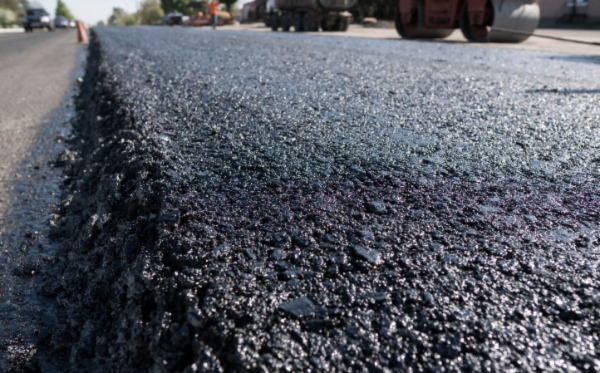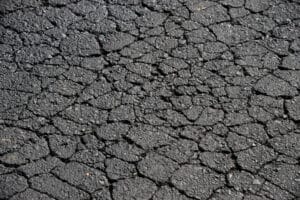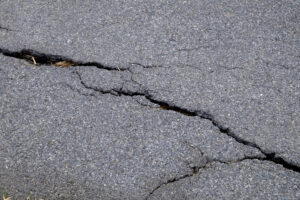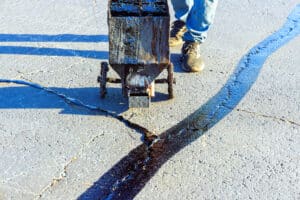What is recycled asphalt? Many home and property owners ask this question and how using this service works. Recycled asphalt is exactly what it sounds like – asphalt that is reused after being processed. Its materials can come from various sources, such as old roads, parking lots, or driveways, making it a greener and cost-effective alternative to new asphalt production.
Below we’ll explain what recycled asphalt is, how it’s used, and the benefits this pavement type provides home and property owners.
What is recycled asphalt?
Asphalt recycling, also known as asphalt reclaiming, is the process of reusing existing asphalt materials to create new roads, driveways, and parking lots. It involves milling the existing asphalt material, breaking it down into smaller pieces, and then adding the crushed asphalt back to the new asphalt mix. The recycling process saves money, reduces waste, and conserves natural resources.
How is asphalt recycled?
The process of recycling asphalt begins with removing the existing asphalt material. This is done through asphalt milling, which involves using heavy machinery to grind the old asphalt material into small pieces. The asphalt milling is then transported to an asphalt recycling plan and mixed with other materials, such as aggregates, sand, and gravel to create a new asphalt mix.
Some homeowners also use asphalt milling for their driveways, like gravel, because it can be compacted a little better than gravel. Asphalt milling driveways are also possible to sealcoat to help keep the millings together. However, they’re still an inferior end product compared to a paved driveway.
What is recycled asphalt used for?
Recycled asphalt is used for a variety of pavement construction purposes. The most common use of recycled asphalt mixture is in road construction and property management. The materials are used to create new roads, highways, parking lots, driveways, walkways, and bike paths.
Another application of recycled asphalt is to use it instead of road base or gravel. Although recycled asphalt is loose and not as durable as paving, it can be compacted together better than gravel and be seal coated (spray only) to help it stick together.
3 Benefits of Recycled Asphalt for Home and Property Owners
Did you know there are many benefits to using recycled asphalt? Here’s why many home and property owners choose this service.
1. Recycled Asphalt is Cost-Effective
One of the most valuable benefits of recycled asphalt is cost savings. Using recycled asphalt in construction or pavement maintenance can lead to significant savings in both fuel and raw material costs. By recycling asphalt, the need for new asphalt production (a resource-intensive process requiring natural resources like oil), is reduced. Eliminating the production of raw materials (virgin asphalt) lowers manufacturing and customer costs.
2. Recycled Asphalt is Environmentally-Friendly
Recycled asphalt is more sustainable than traditional asphalt. New asphalt production requires using natural resources such as oil, while recycling asphalt doesn’t. By recycling asphalt instead of new production, it helps conserve natural resources, save on fuel costs, and reduce greenhouse gas emissions. Overall, recycled asphalt helps reduce waste, which can save on both costs and your carbon footprint.
3. Recycled Asphalt is Equally Effective as New Asphalt with Minimal Maintenance
Another benefit of using recycled asphalt is its durability. Recycled asphalt is equally effective as new asphalt with minimal maintenance— making it ideal for home and property owners looking for cost-effective asphalt solutions.
Brand new asphalt should be seal coated one year after initial paving, then can be resealed at least every three years to preserve the pavement. As with any asphalt surface, traffic and weather will eventually deteriorate the condition, and damage can exceed faster in areas of higher traffic volume, rigid climates, and heavy traffic loads.
As long as you regularly maintain and sealcoat recycled asphalt pavement, it can last as long as new asphalt.
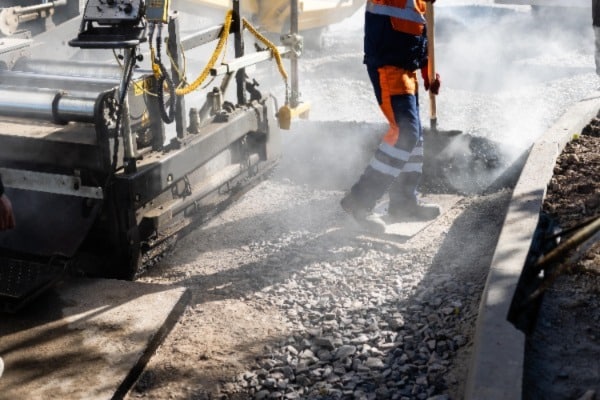
Types of Asphalt Maintenance and Repair Services
While recycled asphalt is durable and easy to maintain, it still requires regular maintenance and repairs to ensure longevity.
Standard asphalt maintenance and repair services include:
- crack sealing
- pothole repairs
- crack repairs
- removing oil stains
- seasonal cleaning and dusting
- sealcoating
If your asphalt is not maintained, cracks and potholes can lead to more extensive damage — which can be costly to repair. Asphalt preventative maintenance services like sealcoating and patching potholes when they first appear before they enlarge are crucial to preserving your asphalt’s lifespan.
While new asphalt is still widely used, recycled asphalt is a growing option that offers many benefits to home and property owners because it can last as long with similar routine maintenance.
Contact Superior Asphalt for Recycled or New Asphalt Services
Now that you know the answer to, “What is recycled asphalt?” and its benefits, you can now make an informed decision. Remember, recycled asphalt requires preventative care to ensure a long lifespan like traditional asphalt — so make sure to use the right asphalt maintenance services.
Do you want to make the switch to recycled asphalt for your home or property? Superior Asphalt is a leading provider of asphalt services in Utah, including crack sealing, asphalt repair and patching, sealcoating, and parking lot striping. Our team can help extend the life of your asphalt pavement and save you money in the long run.
Contact us for recycled or new asphalt services today!
Related Articles:

